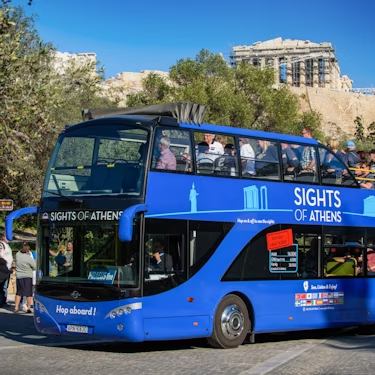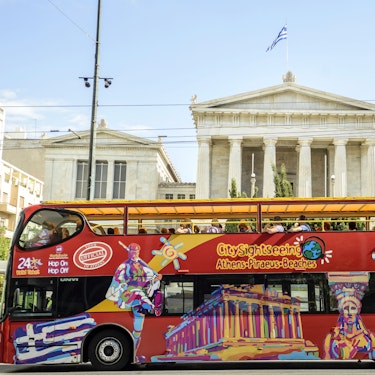More about: 10 Best Things to Do in Plaka Neighborhood in Athens
The Plaka neighbourhood , which you will visit during any trip to the Acropolis in Athens, as it lies at its foot, is the best known and most popular in the Greek capital and also bears witness to the city's history. Although its boundaries are now blurred, its narrow streets and irregular buildings are easy to distinguish due to the Turkish influence on their layout.
Plaka, also known as the Neighbourhood of the Gods for its open view of the Acropolis, is the oldest neighbourhood in Athens and one of the most picturesque and visited areas of the city. Walking around it is undoubtedly one of the best things to do in Athens
1. Walk along Adrianou Street, the main artery of the Plaka neighbourhood
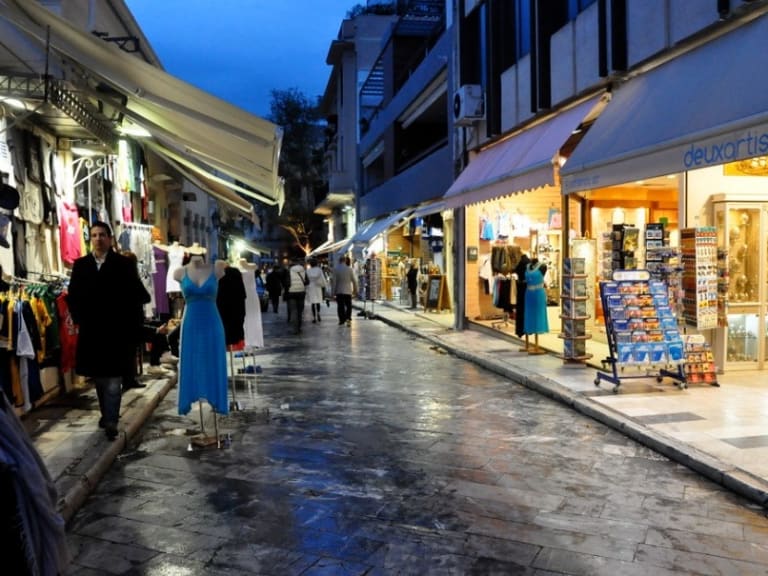
Plaka is the oldest neighbourhood in Athens and has been rebuilt several times, especially during the Turkish rule of the city, when it took on its current appearance of narrow, intersecting streets.
The main street is Adrianou, which runs through the entire neighbourhood and is the central hub of Plaka life, with its shops, variety stores, art galleries, restaurants and monuments.
Adrianou is a picturesque street that starts in Monastiraki and becomes increasingly narrow towards the north until it ends at Filomosou Eterias Square , which marks the heart of the neighbourhood and is surrounded by restaurants with terraces overlooking the Acropolis and the Parthenon and street musicians.
If you visit Athens in summer, you will find the Plaka Flea Market on Adrianou and Kydathineon streets. Here, shops bring all their merchandise out onto the street and reduce their prices. Strolling along Adrianou is the best way to get to know Plaka and its traditional spirit.
Interesting details
- Location... Plaka is located at the foot of the Acropolis, and Adrianou Street runs through the neighbourhood from Monastiraki to Filomosou Eterias Square.
- How to get there... From the centre of Athens at Omonia Square, you can take bus lines 11, 500 and 790 to Philellenon and then walk for five minutes to Plaka. You can also take the Athens tourist buses, which include stops in the neighbourhood.
2. Visit the souvenir shops, craft shops and shops selling typical products
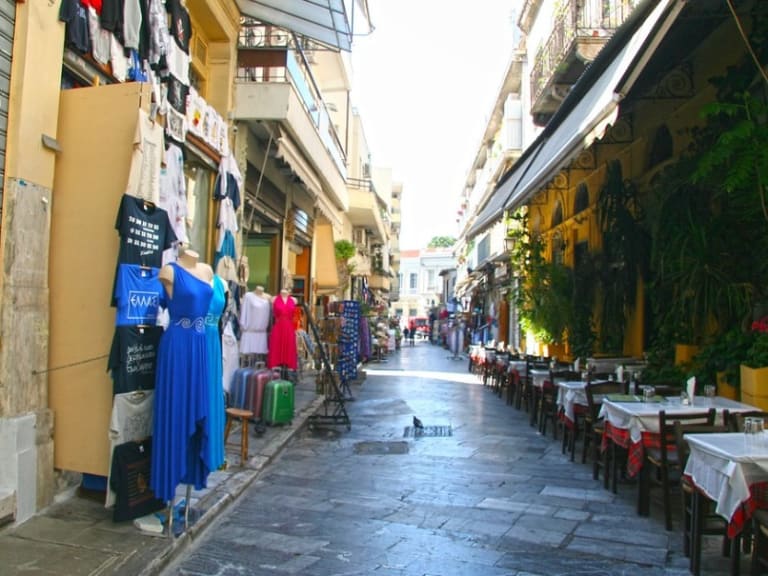
Plaka is the neighbourhood where everyday life in Athens unfolds , as it is not only the most visited place by tourists, but also the epicentre of local life, making it the perfect place to shop and visit souvenir, craft and traditional product shops.
Getting lost among the shops in its narrow streets is one of the best things you can do in Athens.
In the shops of Plaka, you will find clay pottery with motifs from Ancient Greece, wooden crafts, traditional shoes and sandals, and sponges called loofahs that contain natural exfoliants.
You can also buy a nazar, which is an amulet against the evil eye and is typical of Turkey, but has been sold in the neighbourhood since the time of the Turkish occupation.
Beverage shops are also central to Plaka, where you can sample local liqueurs and wines, many of which come from the wineries you may have seen if you have taken a trip to the Greek islands.
Keep in mind that as it is a neighbourhood visited by tourists, prices can be high, but you can haggle over prices in most shops.
- Location... There are shops on every street, as Plaka is a commercial neighbourhood, but most of them are on Andrianou and around Filomosou Eterias Square.
3. Enjoy the local cuisine at the neighbourhood food stalls

Plaka is located at the foot of the Acropolis, which is Athens' biggest attraction, so many visitors come to the neighbourhood to eat and rest after touring the ancient monuments.
There you can enjoy the best local restaurants at good prices, although the cheapest options are found in the streets away from Adrianou.
Among the local dishes you can try in Plaka , I recommend moussaka, a lasagne made with lamb and aubergines. There are also many restaurants serving fish, squid, octopus and seafood, which serve casseroles with stew accompanied by taramasalata sauce , a purée made from fish roe in brine.
If you are in a hurry or looking for a cheaper option, you can opt for kebabs or keftedes.
Plaka is the ideal place to relax after a tour of the Acropolis or to have lunch before continuing your tour of Athens on a bike ride or a cruise along the Athenian coast.
If you plan to go to Plaka for dinner, I recommend choosing a restaurant with a terrace so you can enjoy the spectacle of seeing the Parthenon illuminated at the top of the city.
- Location... The most affordable restaurants are located on the streets away from Adrianou, and from the terraces of the taverns in Filomosou Eterias Square, you can see the Acropolis lit up at night.
4. Explore the Cycladic buildings of Anafiotika
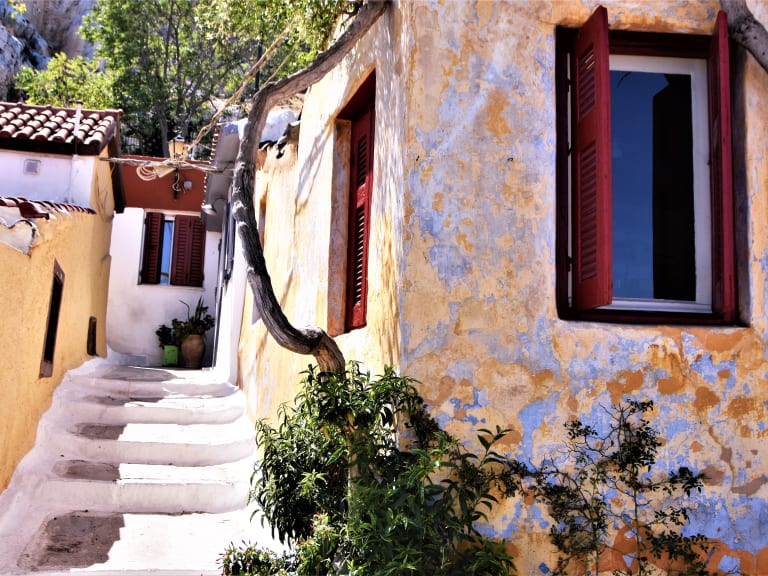
With narrow streets and white houses, Anafiotika is a small neighbourhood within Plaka that bears similarities to the buildings of Andalusia.
The whitewashed houses were built in the 19th century by masons who came to Athens from Anafi to build the Presidential Palace. They brought with them the Cycladic tradition , with its flower-filled windows and low houses, which today attract the attention of visitors to the Greek capital.
A stroll through this picturesque neighbourhood allows you to discover the unique architecture of its labyrinthine streets, but also to explore the only corner of Plaka that is not crowded with shops or surrounded by a chaotic maze of streets and alleys. Anafiotika also has two churches and is located exactly between Stratonos Street and the Acropolis.
If you visit Athens during Christmas, you will also discover that the decorations adorn the windows of Anafiotika, marking a noticeable difference in style from the rest of the buildings in Plaka.
- Location... Anafiotika is located on the edge of the Plaka neighbourhood, between Stratonos and Prytaneion Streets and the base of the Acropolis.
5. Attract good fortune at the Lantern of Lysicrates

The Lantern of Lysicrates may go unnoticed because it is surrounded by some of the most emblematic buildings of Ancient Greece, but it is a 2,500-year-old monument that was very popular in Athens and has a very special history.
This monument was built by the millionaire Lysicrates to celebrate an award he received from the Athenian government for a play he wrote. Today, Greek legend has it that if you want to attract good fortune, you must visit the monument during your trip to Athens.
The Lantern is important to Plaka because, although it is the oldest neighbourhood in Athens, it has been destroyed and rebuilt several times throughout its history and also suffered damage during the Second World War, making the Lantern of Lysicrates, which was remodelled in the 19th century, one of the few ancient treasures it houses.
The monument is located on Tripodon Street , at the end of the pedestrianised Lysicrates Street, which leads directly to Hadrian's Arch and the Temple of Zeus, marking the route of one of the few symmetrical streets in the Plaka neighbourhood.
- Location... The monument is on Tripodon Street, at the end of the pedestrianised Lysicrates Street, which leads to Hadrian's Arch and the Temple of Zeus at Olympia.
6. Visit the Acropolis Museum

The Acropolis Museum is the largest and most famous archaeological museum in Greece and the perfect complement to your visit to the Parthenon and the other monuments.
Formally, it is not located in the Plaka neighbourhood, but on its edge, in Makriyianni. However , due to its proximity to the Acropolis and because Plaka previously occupied a larger area that included the current museum grounds, local guides point to it as one of the neighbourhood's attractions.
The museum displays archaeological finds from the Acropolis and the slopes of the mountain, as well as other archaeological relics from the Peloponnese. It also has a café, a restaurant and a gift and souvenir shop.
It is possible to book a guided tour to learn the secrets of the exhibitions.
The Acropolis Museum area is also home to other museums in the city, such as the Jewish Museum, the Art Museum, the Frissiras Museum, the Music Museum and the University of Athens Museum.
Details of interest
- Location: Dionysiou Areopagitou 15, Athens.
- Opening hours**...** Tuesday to Sunday from 8 a.m. to 8 p.m. and Monday from 8 a.m. to 4 p.m.
- Price... General admission to the museum costs approximately €5.
- How to get there... Take the M2 metro line from the centre of Athens to Akropoli station.
7. Visit the Benizelos Mansion, the oldest house in Athens

Athens is one of the cradles of ancient civilisation and is full of historical monuments and temples, but at the foot of the Acropolis, in Plaka, is the Benizelos Mansion, the oldest house in the Greek capital, built in the 16th century.
Benizelos also houses a museum where you can learn about daily life during the days of the Ottoman Empire.
The building has an eclectic design that blends Greco-Roman architecture with Turkish details. It has Greek arches on the ground floor, covered galleries, and an interior garden dominated by a cistern.
The house has the characteristics of a luxury home of its time and was also a convent. It is estimated to be around 500 years old.
Benizelos also houses an exhibition of paintings from the time of its construction, commissioned by an aristocratic family from Athens, as well as details in wood and stone that shed light on what construction work was like in the 16th century.
Details of interest
- Location... Adrianou 96, Athens.
- Opening hours**...** Monday to Saturday from 10 a.m. to 6 p.m. Sundays from 11 a.m. to 5 p.m.
- Price... Admission costs approximately €10.
- How to get there... From the centre of Athens, take bus lines 1, 12 or 227 to Philellenon.
8. Discover the Orthodox Church of Saint Catherine
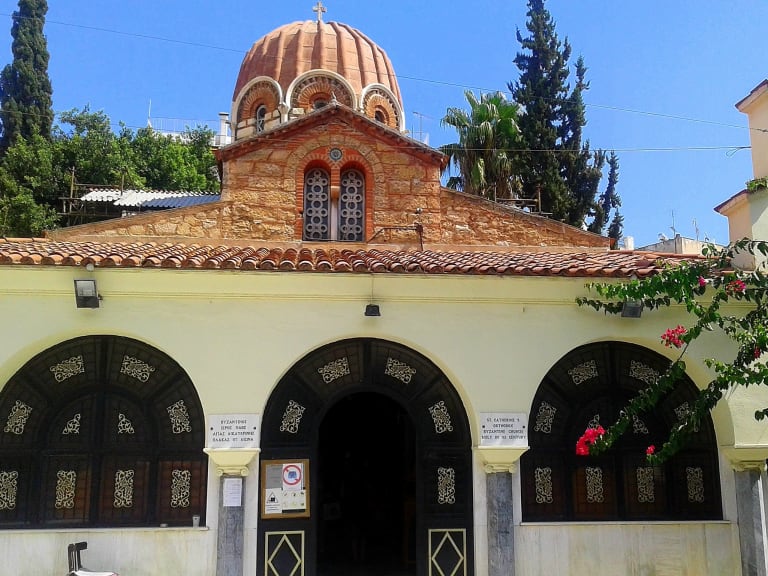
Most Greeks who profess a religion choose Orthodox Christianity. In the Plaka neighbourhood is the Church of Saint Catherine, one of the main churches in Athens.
This church was built on the foundations of an ancient temple dedicated to Artemis and its architecture has eclectic details, with a mixture of remains of Western Roman buildings and Byzantine decoration inside.
Today, it is possible to visit its palm-tree courtyard and see the dome-shaped ceiling. Saint Catherine's is a simple church, built on a Greek cross plan, and marks the history of Athens' growth in height over the last two centuries, as Saint Catherine's is built on the foundations of an ancient temple and yet is still below the current street level.
It is possible to visit the church during religious services and also to commemorate the martyrdom of Saint Catherine every 25th of November. A visit to the church is also usually included in tours and excursions of Athens that include Plaka.
Details of interest
- Location**...** Chairefontos 10, Athens.
- Opening hours**...** It can be visited on days when religious services are held.
- Price**...** Admission is free.
- How to get there… From the centre of Athens, take bus lines 1, 2, 4, 5, 11, 12, 15 or 227 to Philellenon.
9. Visit the Tower of the Winds

At the time of its construction in the 1st century BC, the Tower of the Winds is believed to have been one of the most technologically advanced buildings in Athens.
With its octagonal shape and built in Pentelic marble, the twelve-metre-high tower with a diameter of eight metres measured the time and direction of the wind and, due to its strategic location, was visible from all points of the Roman Agora in Athens.
Today, after several years of renovation, you can visit the Tower of the Winds, and I assure you that you will be surprised by its interior and the functions it performed in its heyday, which led it to be considered a precursor to the bell towers and clock towers of medieval European cities.
I recommend that you pay attention to the friezes that mark the cardinal points and that were coordinated with the compass housed inside and the weather vane on the roof that marked the direction of the wind.
Buildings similar to the Tower of the Winds were used in other Greek cities. You can see them, for example, if you take a trip to Meteora and Delphi, but none of them proved as effective as this Athenian building.
Details of interest
- Location**...** Aiolou 105, Athens.
- Opening hours**...** Every day from 8 a.m. to 5 p.m.
- Price... General admission to the museum costs approximately €5.
- How to get there... Take the M2 metro line from the centre of Athens to Akropoli station and then bus lines 35 and 227 to Monastiraki.
10. Relax in a hammam with a Turkish bath to recover after exploring Plaka

Visiting a hammam is the best way to relax at the end of your tour of the Plaka neighbourhood. These Turkish steam baths are considered sacred spaces in Greece, so they are not only useful for relaxing the body, but also the mind.
Hammams are considered a wet version of the sauna but in the Roman style, which means that visitors should not remain still, but move around different areas, increasing the temperature of the water and inducing sweating.
There are many hammams you can visit in Plaka. The best known are Al Hammam and Old City, but without a doubt the best alternatives are in the old quarter of Athens, given the Turkish influence in the area.
A relaxing visit to a Turkish bath will allow you to recover from a long walk and learn more about Greek culture.
Keep in mind that each hammam may have different general rules and that some do not allow people with tattoos. They are also not suitable for minors, so I recommend that you check the requirements of the Turkish bath you plan to visit in advance.
Details of interest
- Location... There are hammams available throughout the Plaka neighbourhood, but most are located on Tripodon Street.
- Price... Prices start at €45.
- How to get there... From the centre of Athens at Omonia Square, you can take bus lines 11, 500 and 790 to Philellenon and then walk five minutes to Tripodon Street.

